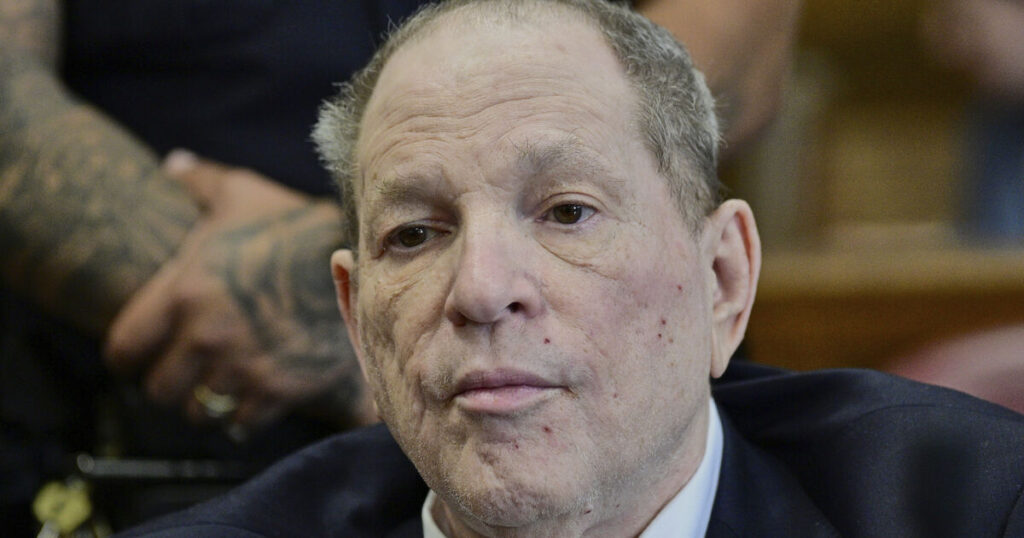Harvey Weinstein will not testify at his New York sex crimes retrial, his lawyer announced on Sunday.
The decision means the jury will soon begin deliberations in the case against the former movie mogul, whose downfall fueled the #MeToo movement.
Closing arguments are scheduled for Tuesday, according to Weinstein’s lawyer, Arthur Aidala, on Sunday night, following the decision not to have Weinstein testify.
The court is closed on Mondays for other cases.
It remains uncertain whether jury deliberations will commence on Tuesday afternoon or Wednesday.
The decision was a difficult one for Weinstein, who has never directly addressed the accusations against him in court. He also did not testify in his previous trials in New York and California, despite being convicted in both.
Weinstein maintains his innocence, and Mr. Aidala previously indicated that Weinstein was carefully considering whether to testify.
While his California appeal is ongoing, Weinstein was granted a retrial in his New York rape and sexual assault case after the state’s highest court overturned his 2020 conviction.
In New York, he is accused of raping Jessica Mann in 2013 and coercing Miriam Haley and Kaja Sokola into oral sex in separate incidents in 2006.
Ms. Mann worked as an actor and hairstylist, Ms. Haley as a production assistant and producer, and Ms. Sokola as a model seeking an acting career.
All three women testified at the retrial, providing emotional and detailed accounts of the alleged abuse they suffered at the hands of Weinstein, who they say exploited his power to lure them into private settings under the guise of helping their careers.
Weinstein’s legal team has argued that any interactions between him and his accusers were consensual.
Under US law, defendants are not required to testify in criminal cases, and many choose not to, for various reasons.
One such reason is the risk of being subjected to cross-examination by prosecutors.
Weinstein has closely followed the New York retrial, often reacting to the accusers’ testimony with headshakes and private conversations with his lawyers.
Mr. Aidala stated outside the court on Thursday that Weinstein believed significant weaknesses had been exposed in the accusers’ stories but also acknowledged that Weinstein was considering whether the jury needed to hear his version of events.
The jury has heard from a limited number of defense witnesses, including one witness whose testimony was presented through a transcript read aloud in court.
Talita Maia, who testified at the 2020 trial but was unavailable for the retrial, instead had her previous testimony read aloud on Friday.
While one court stenographer read the lawyers’ questions from 2020, another stenographer, acting as Ms. Maia, provided her answers, sometimes with added emphasis.
Ms. Maia and Ms. Mann were roommates and friends in 2013 but later had a falling out.
According to Ms. Maia, Ms. Mann never indicated during that time that Weinstein had harmed her in any way.
Ms. Maia and another witness, Thomas Richards, both met with Ms. Mann and Weinstein shortly after the alleged rape.
Both witnesses testified that they observed nothing out of the ordinary.
Mr. Richards, who said he was subpoenaed and didn’t want to be seen as a supporter, recalled Ms. Mann and Weinstein engaging in a “friendly conversation” during the meal he shared with them that day.
Ms. Mann testified earlier this month that she didn’t report the alleged assault to police or anyone else because she feared she wouldn’t be believed and was afraid of Weinstein’s potential reaction.
The defense also called Helga Samuelsen, a friend of Ms. Sokola with friendly connection to Weinstein.
Ms. Samuelsen testified on Thursday that Weinstein visited Ms. Sokola once and spent about a half- hour in a bedroom with her in a New York apartment the women briefly shared in 2005. Ms. Sokola told jurors no such thing happened.
The Associated Press generally refrains from naming individuals who allege sexual assault, but Ms. Sokola, Ms. Mann, and Ms. Haley have consented to being identified.


